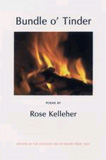 Review by Mary Meriam
Review by Mary Meriam
BUNDLE O’ TINDER
by Rose Kelleher
The Waywiser Press
P.O. Box 6025
Baltimore, MD 21206
ISBN: 978-1904130-33-8
2008, 88 pp., £7.99
www.waywiser-press.com
Why do we read poems? Poems can be songs, prayers, chronicles, confessions, memories, meditations, complaints, portraits. Poems give us contact with the world and help us feel less alone. Reading a poem can be a moment of pleasure in an otherwise painful world. Sometimes poems speak for us when we can’t find the words, when it all seems too terrible. Here’s where we can be thankful for Rose Kelleher’s brave, strong book of poems, Bundle o’ Tinder. This book wrestles demons to the ground and pins them there, crushed.
In Kelleher’s poem, “Lourdes,” compassion is in full force. Lourdes is a grotto in France, with spring water that many pilgrims believe can heal. With great gusto, Kelleher writes:
Burst the spigots. Overflow.
Send mercy surging down the mountainside,
washing over every borderline.
Don’t just stand there. Go
These commanding lines are just one stanza in a four-stanza poem, which ends with the line “Cure my doubt.” We do not find wishy-washy tones in Bundle o’ Tinder, but unabashed exhortations for justice and mercy.
It so happens that I read Kelleher’s manuscript as she was preparing to enter it in a contest. I told her it was so good she would surely win. And folks, she won! The contest was judged by the renowned poet Richard Wilbur, who wrote in the foreword, after listing some of his favorite poems, “I suspend my list of good poems, lest it go on and on.” Now I have something of the same happy dilemma: how to choose one poem for you, out of so many good ones.
While “Lourdes” is a poem of tremendous sincerity, “Laissez-faire” is a satirical response to a heartless remark made by the British Treasury Secretary in 1846, about the Great Irish Famine, when 25 percent of the population of Ireland died of starvation:
Laissez-faire
“[The overpopulation of Ireland] being altogether
beyond the power of man, the cure has been applied
by the direct stroke of an all-wise Providence…”
Charles Trevelyan, British Treasury Secretary, 1846The extra folk. The fat. The gristle.
Ragweed, nettle, buckthorn, thistle.
Girls in shirtwaist factories.
Brushwood burned to free the trees.
Dusty little Mom-and-Pops.
Apple peelings, turnip tops.
The latchkey kid, the lemon rind,
the poor New Orleans left behind.
The trampled ant, the straying sheep,
the badly schooled, the compost heap
that must decay to feed the crop.
John Henry’s carcass, should he drop;
his life, his living, should he live.
The damn we frankly do not give.
The sack in which we drown the whelp
(as Nature sometimes needs our help).
The brisk, efficient meter, short phrases, short lines, and tight, true rhymes are like the short, sharp strokes of a broom sweeping away detritus. All the “f” sounds in the first four lines produce a percussive spitting effect. The poem is a felicitous pile of images of society’s unfortunate outsiders. Except that here, the outsiders are swept together into the poet’s warm heart, recognized and comforted.
It’s not a question of an issue, but a question of the people I know who are close to me, who are health-care workers or living with illnesses, or the neighbors, housed and homeless, I pass on the street, or the grocery store that goes out of business where I’ve bought my salad and broccoli every day for the past five years. All of those may be reflected or transformed in my work… (Marilyn Hacker)
“Laissez-faire” is French for “allow to do,” and it means a policy or attitude of letting things take their own course, without interfering. By paying attention to people, the poem “Laissez-faire” reverses the meaning of its title. In the great line, “The damn we frankly do not give,” satire works to reverse the course of a distant, uncaring attitude, and bring home the message of the damn we frankly do give.
“The First Uprising” has such a beautiful first line it’s like an entire poem in itself: “The blackest plums are closest to the sun.” There’s a symmetry to the line with blackest/closest and plums/sun, and a striking opposition between black and sun. We usually hear of planets, not plums, being close to the sun. The poem that follows this intriguing first line is about human evolution, a subject that arises in several other poems in the book, including the gorgeous, tender-hearted sonnet “Neanderthal Bone Flute.”
These lines from the poem, “Not Our Dog,” place us in the common human dilemma of homelessness or imminent homelessness:
But trouble spies on us behind the blinds,
a giant dog that’s caught our scent. At night,
its eyewhite glows between the slats, its breath
fogs the windowpane; and while we hide
at home, the mangy world of war, disease
and famine hunkers down to wait for us.
Those of us already caught by the “giant dog” can be thankful we’ve found a respite in Rose Kelleher’s poems.